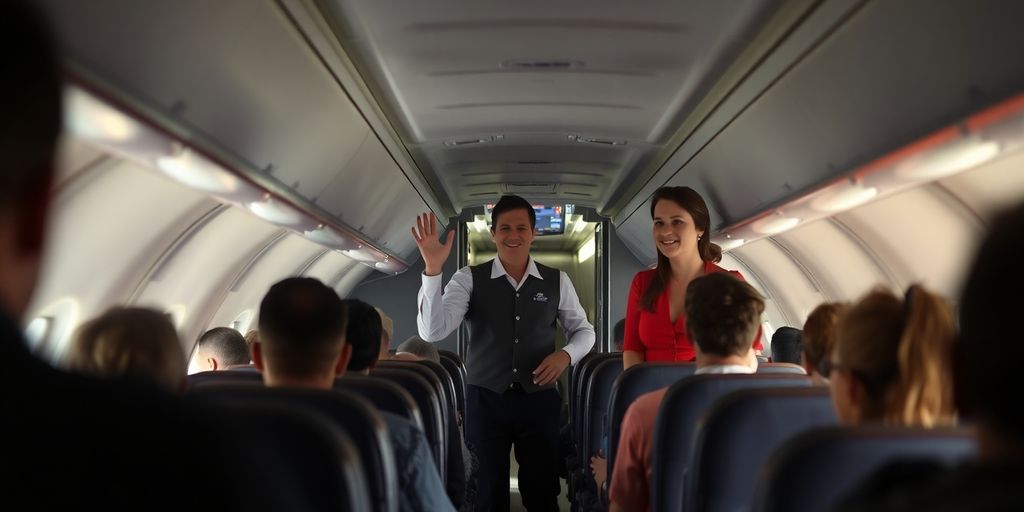Turkey’s Directorate General of Civil Aviation (DGCA) has implemented new regulations allowing for fines against airline passengers who stand up, unbuckle, or access overhead compartments before the aircraft has come to a complete stop. This move aims to enhance safety and streamline deplaning, addressing a common and often chaotic in-flight habit.
New Regulations Target Premature Standing
In a bid to curb the common practice of passengers rushing to stand up immediately after landing, Turkey’s DGCA, under the leadership of Kemal Yüksek, has introduced a directive allowing for fines of up to 2,603 Turkish Lira (approximately $70). This regulation targets passengers who:
- Unbuckle their seatbelt while the plane is still taxiing.
- Open overhead bins before the aircraft has come to a complete stop at the gate.
- Push ahead of others in line, ignoring disembarkation order.
This measure comes after numerous passenger complaints and flight inspections highlighted safety concerns and disruptions caused by premature deplaning attempts.
Safety and Operational Concerns
The DGCA emphasizes that this seemingly minor habit poses significant risks:
- Passenger Safety: Sudden movements during taxiing can lead to falls or injuries, especially during unexpected stops or turns.
- Baggage Hazards: Opening overhead bins prematurely risks items falling and injuring seated passengers.
- Emergency Interference: Standing passengers can obstruct crew members and emergency protocols in critical situations.
- Flight Delays: Disorderly deplaning can delay aircraft turnaround times and impact connecting flights.
Enforcement and Implementation
To ensure compliance, the new policy outlines a clear enforcement strategy:
- Monitoring: Flight crews will be trained to monitor and report violations, with surveillance footage potentially used in extreme cases.
- Reporting Protocol: Airlines are required to submit incident reports to the DGCA for rule violations.
- Fine Issuance: The DGCA will issue administrative fines to reported passengers, potentially using contact information from ticket bookings.
- Appeals Process: A provision for passengers to contest fines is being developed.
Turkish carriers, including Turkish Airlines, Pegasus Airlines, and AnadoluJet, are expected to implement onboard announcements and training sessions to inform both passengers and crew about the new rules.
Global Context and Public Reaction
While Turkey is among the first to impose financial penalties for post-landing misconduct, the issue of unruly passenger behavior is a growing global concern. Other aviation authorities, such as the FAA in the United States and regulators in the European Union, have also addressed in-flight disruptions with various penalties.
Public reaction in Turkey and the global travel community has been mixed. Supporters view it as a necessary step to enhance safety and order, while critics argue it might be an overreach. However, surveys suggest that over 58% of Turkish passengers support the measure, particularly if it leads to safer and more orderly deplaning processes.
Education Over Punishment
Experts suggest that for the policy to be truly effective, airlines should prioritize education. This includes:
- Updated Announcements: Clear, multi-language in-flight instructions before landing.
- Onboard Videos: Short clips explaining the safety rationale behind waiting.
- First-Time Warnings: Allowing initial warnings before imposing fines.
This approach aims to frame the rule as a safety enhancement rather than merely a revenue-generating tool, fostering a cultural shift towards greater discipline and respect in shared travel spaces.
Sources
- Flying to Turkey? This one annoying in-flight habit might earn you a hefty fine, Times of India.
- Better stay buckled up until your plane stops in Turkey or you’ll face fines, CBS News.
- Turkey will fine airline passengers who unbuckle before the plane stops, AP News.
- Turkey Cracks Down on Fliers Who Stand Up Too Soon, Threatening Fines, The New York Times.
- Turkey cracks down on air passengers who rush to deplane, CBS News.






